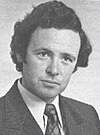Division of Gellibrand
| Gellibrand Australian House of Representatives Division | |
|---|---|
 Division of Gellibrand in Victoria, as of the 2022 federal election | |
| Created | 1949 |
| MP | Tim Watts |
| Party | Labor |
| Namesake | Joseph Gellibrand |
| Electors | 108,169 (2022) |
| Area | 146 km2 (56.4 sq mi) |
| Demographic | Inner metropolitan |
The Division of Gellibrand is an Australian Electoral Division in Victoria. The division was created in 1949 and is named after Joseph Gellibrand, a pioneer settler of the Melbourne area. It is located in the industrial inner western suburbs of Melbourne and includes Altona, Altona North, Altona Meadows, Kingsville, Laverton, Newport, Seabrook, Seaholme, Seddon, South Kingsville, Spotswood, Williamstown, Williamstown North and Yarraville; and parts of Brooklyn, Footscray, Laverton North, Point Cook, West Footscray and Williams Landing.
Geography
[edit]Since 1984, federal electoral division boundaries in Australia have been determined at redistributions by a redistribution committee appointed by the Australian Electoral Commission. Redistributions occur for the boundaries of divisions in a particular state, and they occur every seven years, or sooner if a state's representation entitlement changes or when divisions of a state are malapportioned.[1]
History
[edit]
The Division has been held by the Australian Labor Party for its entire existence; it is located in Labor's traditional heartland of western Melbourne, and is characterised by a very diverse, multicultural population. Labor has never tallied less than 60 percent of the two-party vote, and until 2010 always won an outright majority on first preferences alone.
Its most prominent members have been Ralph Willis, a Cabinet minister in the Hawke and Keating governments, and Nicola Roxon, a Cabinet minister in the Rudd government and the Gillard government and first female Attorney-General.
In recent years there has been considerable gentrification in the inner-city suburbs such as Footscray, Williamstown and Yarraville, and a consequent rise in the progressive Greens vote, which rose to 37 percent in Footscray in the 2013 election. In the west, a solid patch of working-class suburbia remain strongly Labor-leaning.
For several years, Gellibrand was Labor's safest seat in the Federal Parliament. The current member for Gellibrand since the 2013 election is Labor's Tim Watts.
Members
[edit]| Image | Member | Party | Term | Notes | |
|---|---|---|---|---|---|

|
Jack Mullens (1896–1978) |
Labor | 10 December 1949 – April 1955 |
Previously held the Victorian Legislative Assembly seat of Footscray. Did not contest.
Failed to win the Division of Melbourne in 1955. | |
| Labor (Anti-Communist) | April 1955 – 10 December 1955 | ||||

|
Hector McIvor (1900–1992) |
Labor | 10 December 1955 – 2 November 1972 |
Retired | |

|
Ralph Willis (1938–) |
2 December 1972 – 31 August 1998 |
Served as minister under Hawke and Keating. Retired | ||

|
Nicola Roxon (1967–) |
3 October 1998 – 5 August 2013 |
Served as minister under Rudd and Gillard. Retired | ||

|
Tim Watts (1982–) |
7 September 2013 – present |
Incumbent |
Election results
[edit]| Party | Candidate | Votes | % | ±% | |
|---|---|---|---|---|---|
| Labor | Tim Watts | 39,382 | 42.72 | −6.30 | |
| Liberal | Monica Clark | 24,869 | 26.97 | −3.80 | |
| Greens | Suzette Rodoreda | 15,241 | 16.53 | +2.67 | |
| United Australia | Abraham Isac | 5,080 | 5.51 | −0.14 | |
| One Nation | Rob Braddock | 2,802 | 3.04 | +3.04 | |
| Liberal Democrats | Chloe Glasson | 2,185 | 2.37 | +2.37 | |
| Victorian Socialists | Andrew Charles | 1,503 | 1.63 | +1.63 | |
| Australian Federation | Sharynn Moors | 1,135 | 1.23 | +1.23 | |
| Total formal votes | 92,197 | 95.12 | −1.25 | ||
| Informal votes | 4,729 | 4.88 | +1.25 | ||
| Turnout | 96,926 | 89.67 | −1.22 | ||
| Two-party-preferred result | |||||
| Labor | Tim Watts | 56,738 | 61.54 | −1.48 | |
| Liberal | Monica Clark | 35,459 | 38.46 | +1.48 | |
| Labor hold | Swing | −1.48 | |||
Graphs are unavailable due to technical issues. There is more info on Phabricator and on MediaWiki.org. |
References
[edit]- ^ Muller, Damon (14 November 2017). "The process of federal redistributions: a quick guide". Parliament of Australia. Retrieved 19 April 2022.
- ^ Gellibrand, VIC, 2022 Tally Room, Australian Electoral Commission.
